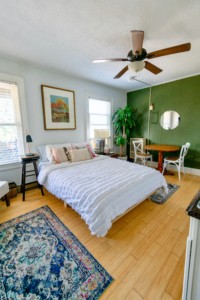
A big part of Feng Shui is the observation and application of Yin Yang Theory. We strive to not have our personal surroundings too yin or too yang. Yin attributes include dark, quiet, narrow, and small. Yang attributes include the polarity: bright, loud, wide and large. We can apply yin and yang assessments to the natural environment as well as to man-made structures and landscapes.
Yin-Yang Theory can be extended to many other features, and nuanced, such as mountains being initially in the ‘yin” category, but there are both yin and yang mountains. A yin mountain would be a barren mountain landscape and yang mountains would have healthy green plants and animal life. Aside from physical attributes, like a high ceiling or a low ceiling, activities can be categorized as yin or yang. Sleeping and resting are in the yin column, while working and socializing are in the yang column. Normally, we don’t want to see a conflict between yin and yang activities, such as having a work desk in a bedroom.
The definition of a studio apartment is a small space with a bathroom, a small or open kitchen and a larger room that is used as a combined bedroom and living space. Some people use a Murphy bed and disguise the space during the day as a living room and then the same space becomes a bedroom when needing to sleep. Other people have a bed and no couch, essentially functioning in their bedroom all the time.
People ask if this is “good” feng shui to live in a studio apartment. We have two issues here to consider. One is the sheer smallness of the space, which many people find claustrophobic and limiting. The other issue is combining the work/social space with the sleeping space, no matter the size of the space. Of course, it is easier to create a separation of activities, even in one room, when the one room is larger, such as large loft spaces.
With the global pandemic, the practice of working from home has become even more popular or necessary. With all other aspects to a living space being comparable, living in a studio apartment is not ideal and many people only choose to live in one if they have no other choice. Our psyches are very adaptable, but also very influenced by the surroundings, conscious of it or not. As much as we humans are social beings, we also still need private space and the ability to separate the yin and yang activities of our lives.
When we work at night while it is dark outside, we upset our circadian rhythm with artificial lighting. We work at home and even in our cars because society has turned into what it is, with many people defined as classic workaholics. Some people hyper focus on a Feng Shui edict or principle, but everything should be taken in context. For example, while it is not ideal to live in a studio apartment, it might still have better feng shui than a large mansion if the mansion has a terrible floor plan, which undermines the occupants in their health, relationships, and income.
Can You Apply Feng Shui At All in a Studio Apartment?
Of course you can apply, on a small scale, many Feng Shui principles in a studio apartment. Something small, like a standing screen or bookcase, could divide activities, yin and yang energy, and separate a sleeping area from a work station. You just don’t want to add a “remedy” that creates another problem. Don’t hang up curtains or place bulky items in a small space if it is going to make you feel blocked in or reduce adequate lighting.
If you work all day in a studio apartment and need to cut the cord for a night of relaxation, you may need to leave the apartment for a short period, take a walk, and return with a committed mind set to leave work alone for the rest of the evening.
When living in a studio apartment, it is likely that you are surrounded by others in small spaces and it could be a building with a high volume of people since everyone has small spaces within the same building. The noise factor could be high, so a common sense remedy is to do what you can to sound-proof your own space.
On a miniature scale, you can do a flying star chart for your studio apartment and see if it makes a difference where you sleep and where you have a work desk, all other features being equal. Constructing a flying star chart of your home, regardless of the size, should be done by a professional, along with the interpretation of the findings. This is especially true with a studio apartment, where a seasoned professional can decide which flying stars to prioritize, based on how each area is used.
Author: Kartar Diamond
Company: Feng Shui Solutions ®
From the Feng Shui Architecture and Design Blog Series
